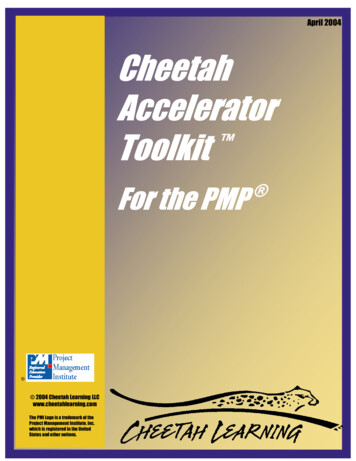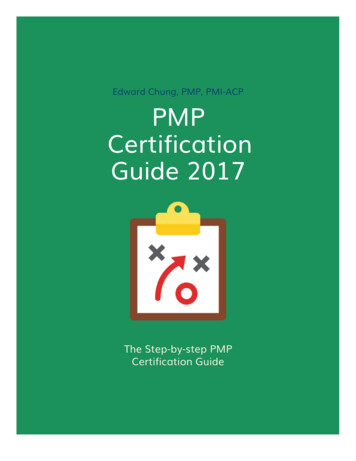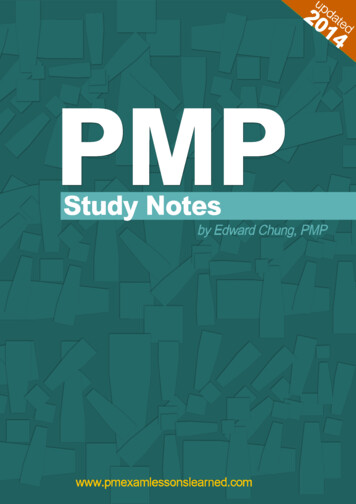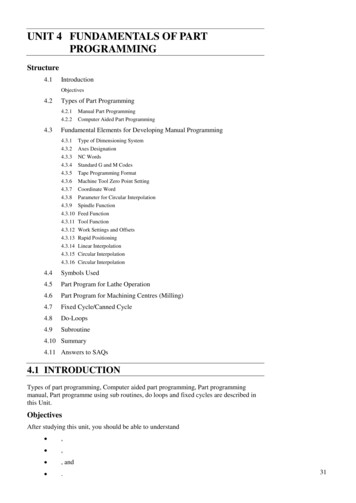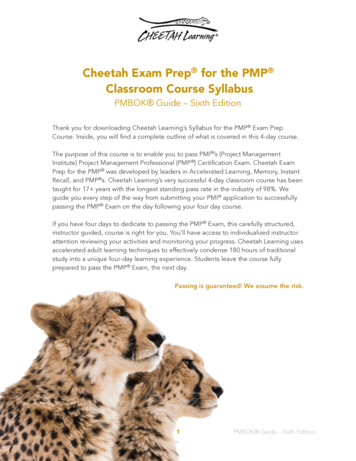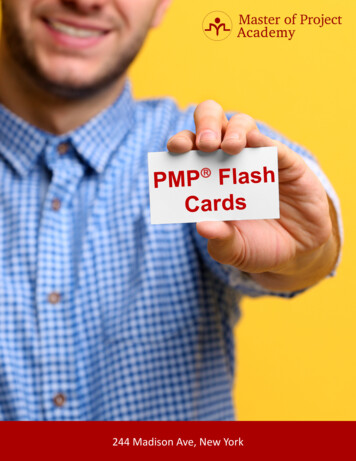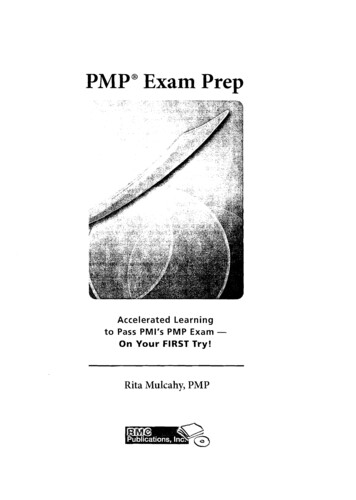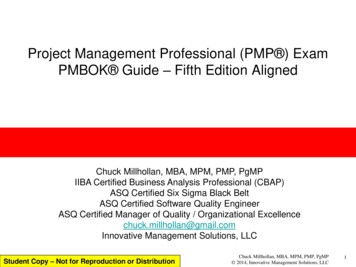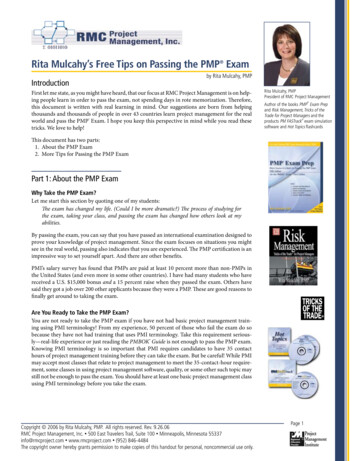
Transcription
Rita Mulcahy’s Free Tips on Passing the PMP ExamIntroductionby Rita Mulcahy, PMPFirst let me state, as you might have heard, that our focus at RMC Project Management is on helping people learn in order to pass the exam, not spending days in rote memorization. Therefore,this document is written with real learning in mind. Our suggestions are born from helpingthousands and thousands of people in over 43 countries learn project management for the realworld and pass the PMP Exam. I hope you keep this perspective in mind while you read thesetricks. We love to help!Rita Mulcahy, PMPPresident of RMC Project Management Author of the books PMP Exam Prepand Risk Management, Tricks of theTrade for Project Managers and theproducts PM FASTrack exam simulationsoftware and Hot Topics flashcardsThis document has two parts:1. About the PMP Exam2. More Tips for Passing the PMP ExamPart 1: About the PMP ExamWhy Take the PMP Exam?Let me start this section by quoting one of my students:The exam has changed my life. (Could I be more dramatic?) The process of studying forthe exam, taking your class, and passing the exam has changed how others look at myabilities.By passing the exam, you can say that you have passed an international examination designed toprove your knowledge of project management. Since the exam focuses on situations you mightsee in the real world, passing also indicates that you are experienced. The PMP certification is animpressive way to set yourself apart. And there are other benefits.PMI’s salary survey has found that PMPs are paid at least 10 percent more than non-PMPs inthe United States (and even more in some other countries). I have had many students who havereceived a U.S. 15,000 bonus and a 15 percent raise when they passed the exam. Others havesaid they got a job over 200 other applicants because they were a PMP. These are good reasons tofinally get around to taking the exam.Are You Ready to Take the PMP Exam?You are not ready to take the PMP exam if you have not had basic project management training using PMI terminology! From my experience, 50 percent of those who fail the exam do sobecause they have not had training that uses PMI terminology. Take this requirement seriously—real-life experience or just reading the PMBOK Guide is not enough to pass the PMP exam.Knowing PMI terminology is so important that PMI requires candidates to have 35 contacthours of project management training before they can take the exam. But be careful! While PMImay accept most classes that relate to project management to meet the 35-contact-hour requirement, some classes in using project management software, quality, or some other such topic maystill not be enough to pass the exam. You should have at least one basic project management classusing PMI terminology before you take the exam.Copyright 2006 by Rita Mulcahy, PMP. All rights reserved. Rev. 9.26.06RMC Project Management, Inc. 500 East Travelers Trail, Suite 100 Minneapolis, Minnesota 55337info@rmcproject.com www.rmcproject.com (952) 846-4484The copyright owner hereby grants permission to make copies of this handout for personal, noncommercial use only.Page
Do you know enough about project management to take the PMP exam? Check yourself against the following lists.If you answer “yes” to two or more of the following questions, you do not know enough about project management to takethe exam: Do you experience large cost or schedule overruns? Do you have unrealistic schedules? Are there excessive changes to the scope or schedule of your projects? Do you experience poor communications and increased conflict? Do you find that you run out of time near the end of projects? Do you experience unsatisfactory quality? Do you have problems with low morale on your projects? Are people on the team unsure of what needs to be done? Do your projects require excessive rework and overtime? Do you have too many project meetings?If you answer “no” to five or more of the following questions, you do not know enough about project management to takethe exam: Do you use a step-by-step process for managing projects and understand the reasons why each step is necessary? Do you understand the roles of the project manager, sponsor, and team? Do you use historical information from previous projects? Do you apply lessons learned from previous projects? Do you create lessons learned on your projects? Do you use and understand project charters? Do you know what a work breakdown structure is and how to create it, and do you understand that it is not a list in abar chart? Do you know how to manually create a network diagram? Do you understand critical path, including how to find it and what benefits it provides the project manager? Do you use three-point estimating on your projects? Do you use and apply Monte Carlo analysis? Do you understand earned value? Do you apply schedule compression, crashing, and fast tracking on your projects? Do you know that an unrealistic schedule is the project manager’s fault? Do you create realistic and approved project management plans that you are willing to be held accountable to achieving? Do you measure and implement corrective action on your projects? Do you understand the risk management process and know that risk management involves more than just using achecklist? Do you understand expected monetary value? Do you calculate budget reserves on your projects and understand their relationship to risk management? Do you control the project to the project management plan?If, by going through the questions above, you find that you do not have enough project management knowledge to take thePMP exam, I encourage you to consider taking RMC’s three-day Tricks of the Trade for Project Management course inaddition to our two-day PMP Exam Prep course. Combining these courses into a one-week experience will give you the 35contact hours that PMI requires to take the exam. RMC’s e-Learning-based PMP Exam Prep course also meets PMI’s 35contact-hour requirement. You can learn more about these opportunities in the second section of this article or by visitingour Web site at www.rmcproject.com.Applying to Take the ExamTo qualify for the exam, you must submit an application to PMI by mail or electronically. PMI’s response time is significantly shorter if you apply online at www.pmi.org. The application requires documentation of your experience in leadingand directing project tasks and your training in project management. The trick here is to remember that PMI must knowthat most people do not have detailed records of their previous projects; the only way most people can really complete theapplication is by making an educated guess as to the amount of time they spent in various areas of project management.Copyright 2006 by Rita Mulcahy, PMP. All rights reserved. Rev. 9.26.06RMC Project Management, Inc. 500 East Travelers Trail, Suite 100 Minneapolis, Minnesota 55337info@rmcproject.com www.rmcproject.com (952) 846-4484The copyright owner hereby grants permission to make copies of this handout for personal, noncommercial use only.Page
PMI’s requirements to take the exam are as nceLeading andDirectingProject TasksPMExperience1Bachelor’sdegree orequivalent35 contacthours4,500 hours3 years withinthe last 6 years2High schooldiploma orequivalent35 contacthoursNumber ofQuestions2007,500 hours5 years withinthe last 8 yearsApplications may be audited by PMI. If you are audited, you will be required to provide copies of diplomas and signatures of themanagers of the projects referenced on your application.Upon approval of your application, you will receive a letter from PMI authorizing you to take the exam. PMI often makes changes to the way the exam is administered. Therefore, you should read the authorization letter carefully. You must take the examwithin one year from the date of approval! In North America and much of the rest of the world, the exam is computer-basedand is given by appointment through Prometric Testing Centers. The cost of taking the exam is U.S. 405 for PMI members orU.S. 555 for non-PMI members. A one-year individual membership to PMI costs U.S. 119.What Is the PMP Exam Like?PMI’s Web site states:The PMP Credential Examination measures the application of knowledge, skills, tools, and techniques that are utilized inthe practice of project management. The PMP examination is comprised of 200 multiple-choice questions. Of the 200 questions, 25 questions are pretest questions. Pretest questions do not affect the candidate’s score and are used in examinationsas an effective way to increase the number of examination questions that can be used in future PMP exams. The pretestquestions are randomly placed throughout the exam. The allotted time to complete the examination is four hours. The fourhour examination is preceded by a 15-minute computer tutorial, which is not part of the allotted four hours.PMP Credential examination questions: are developed and validated by global work groups of content experts; are referenced to current resources from project management textbook sources; are monitored through psychometric analysis; satisfy the test specifications of a job analysis.The passing score for the exam is 61 percent (106 questions correct out of 175 scored questions).Keep in mind three important things about the PMP exam: First, this is not a test of the information in the PMBOK Guide!Second, you cannot rely on only real-world experience. Third, training in professional project management based on thePMBOK Guide is critical! This does not mean you need weeks of training or a master’s certificate in project management to takethe exam, however.The PMP exam includes 200 multiple-choice questions with four answers per question. (Note: If your study material has fivechoices per question, do not use it! It is either related to an old exam and is therefore out-of-date or it has not been created usingthe same modern test creation standards as the exam.)The PMP exam is knowledge, application, and analysis based and includes many situational questions. The exam questions arerandomly generated from a database containing hundreds of questions. The questions may jump from topic to topic or covermultiple topics in a single question. You get one point for each correct answer. There is no penalty for wrong answers.The following table offers a breakdown of the percentage of scored questions currently on the exam in each process group:(Note: This list may change from year to year. Visit www.pmi.org for the latest list.)Copyright 2006 by Rita Mulcahy, PMP. All rights reserved. Rev. 9.26.06RMC Project Management, Inc. 500 East Travelers Trail, Suite 100 Minneapolis, Minnesota 55337info@rmcproject.com www.rmcproject.com (952) 846-4484The copyright owner hereby grants permission to make copies of this handout for personal, noncommercial use only.Page
PMP ExamPM ProcessProject InitiatingProject PlanningProject ExecutingProject Monitoring and ControllingProject ClosingProfessional and Social ResponsibilityPercent of Questions1123272199For many people, the toughest knowledge areas on the exam are Framework, Integration, Procurement, Risk, and Time. Thetoughest process groups are Executing, Monitoring and Controlling, and Professional and Social Responsibility. Make sureyou study these knowledge areas and process groups carefully.Warning: The PMP exam is not like any multiple-question exam you have taken before. The passing score may be 106 out of175 (about 61 percent), but because the exam is written psychometrically, there are questions on the exam that even expertsfind difficult. Do not get frustrated!How Are the Questions Written?Feedback from thousands of my students has provided the following insights: The PMP exam tests knowledge, application, and analysis. This makes the PMP exam more than a test of memory. Youmust know how to apply your knowledge and be able to analyze situations involving this information. Do not expectthe exam to have all straightforward, definition-type questions. It is important to realize that the PMP exam deals with real-world use of project management. It contains many “Whatshould you do in this situation?” questions (situational questions). These questions are extremely difficult if you havenot used project management tools in the real world or do not realize that your project management efforts includecommon errors. You have to have been there to pass the exam. The exam emphasizes the process of project management (the project management life cycle, or process groups). There are a few instances, particularly for network diagram questions, where the same set of data may be used for additional questions later in the exam. Only a few questions on the exam expect you to memorize the step-by-step PMBOK Guide processes. Only 10 to 12questions expect you to memorize the inputs or outputs from the PMBOK Guide. There may be only 8 to 10 formula-related calculations on the exam. There should only be 10 to 12 earned-value questions on the exam. Some of these questions may not require calculations using the formulas. Most acronyms (e.g., WBS for work breakdown structure) should be spelled out on the exam. The correct answers should not include direct quotations from the PMBOK Guide. Most students feel uncertain about only 40 of the 200 questions on the PMP exam. Many students need only two and a half hours to finish the PMP exam and then take the rest of the time to review theiranswers.Types of Exam QuestionsMany people ask what the questions on the exam are like. The questions are mostly situational. Many are ambiguous, andsome seem like they have two or more right answers. Be prepared for these types of questions so you will not waste time orbe caught off guard when you are taking the exam.Copyright 2006 by Rita Mulcahy, PMP. All rights reserved.
PMI’s salary survey has found that PMPs are paid at least 10 percent more than non-PMPs in the United States (and even more in some other countries). I have had many students who have received a U.S. 15,000 bonus and a 15 percent raise when they passed the exam. Others have said they got a job over 200 other applicants because they were a .
